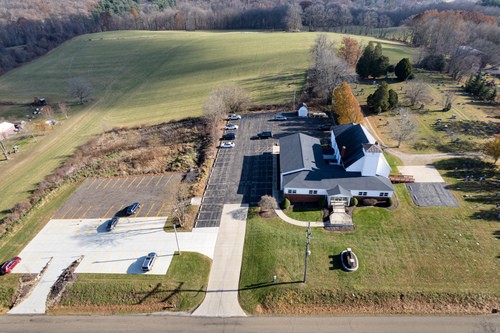How it all started...
Hilltop Community Church began in the late 1800's as a break off of St. Johns Church in downtown Mansfield. The church began as a German Reformed church and only German was spoken.
It originally began in 1847 in a log building on German Church Road, about a half-mile south of where the current church stands. This log building was built by the Dunkards.
The church existed in this log building for about two years when the church was erected on its present site. There was a large settlement of Germans in this area of the township, having come here from Western Pennsylvania. Their primary occupation was farming.
Those who organized the church were Martin Toby, Peter Strader, Conrad Englehart, John Strader, Christian Mull, J.W. Strader and the Kohisers. The early pastors were Revs. Handchy, Tressel, Weiscotten, Lenshaw, Krause, and Henry Walcer. The membership in the 1880's was about 60 members with about 50 attending Sunday School.
The original church consisted only of the sanctuary area with no basement. It was heated with two large stoves that had to be heated up in the winter. The church was struck several times by lightening and burned to the ground. Each time it was rebuilt. The current building dates back to the 1900's. A two story classroom was added to the existing building in 1965 and a basement was also dug by hand under the current sanctuary.
For awhile in the 40's, there was no pastor and the church sat vacant until Marjorie Davis and several women began holding Sunday School for children. This eventually lead to Jim Davis becoming a part-time pastor for 38 years (1945-1983) followed by Dan Betts, who was a pastor for 9 years (1984-1993). Curt Wagner, was pastor for 14 years (1995-2009). Andy Hupp, was pastor for 8 years (2009-2017). Ivanildo Trindade, was pastor for 2 years (2017-2020). Nate Gailey became the lead pastor in 2021, but has served on staff since 2012.
It originally began in 1847 in a log building on German Church Road, about a half-mile south of where the current church stands. This log building was built by the Dunkards.
The church existed in this log building for about two years when the church was erected on its present site. There was a large settlement of Germans in this area of the township, having come here from Western Pennsylvania. Their primary occupation was farming.
Those who organized the church were Martin Toby, Peter Strader, Conrad Englehart, John Strader, Christian Mull, J.W. Strader and the Kohisers. The early pastors were Revs. Handchy, Tressel, Weiscotten, Lenshaw, Krause, and Henry Walcer. The membership in the 1880's was about 60 members with about 50 attending Sunday School.
The original church consisted only of the sanctuary area with no basement. It was heated with two large stoves that had to be heated up in the winter. The church was struck several times by lightening and burned to the ground. Each time it was rebuilt. The current building dates back to the 1900's. A two story classroom was added to the existing building in 1965 and a basement was also dug by hand under the current sanctuary.
For awhile in the 40's, there was no pastor and the church sat vacant until Marjorie Davis and several women began holding Sunday School for children. This eventually lead to Jim Davis becoming a part-time pastor for 38 years (1945-1983) followed by Dan Betts, who was a pastor for 9 years (1984-1993). Curt Wagner, was pastor for 14 years (1995-2009). Andy Hupp, was pastor for 8 years (2009-2017). Ivanildo Trindade, was pastor for 2 years (2017-2020). Nate Gailey became the lead pastor in 2021, but has served on staff since 2012.



Who were the Dunkards?
The Dunkards were part of the Brethren movement, and were frequently called "Dunkers," The movement began in Germany in 1708 as part of the spiritual awakening called Pietism. In that year a small group led by Alexander Mack (1679 - 1735) baptized one another by immersion, facedown, three times in a flowing stream: this form of Baptism became a distinctive practice. Persecuted by the state church in Germany, the Dunkers immigrated to America from 1719 to 1729. Mack and his followers migrated to Pennsylvania from Germany in 1719. Small groups then broke away from the main body, either because it seemed too liberal or not liberal enough.
They wore plain clothing, coats with standing collars for the men, plain bonnets and hoods for the women. Men were urged, but not required, to wear beards; they should not wear mustaches alone. Women should not wear jewelry.
They were to avoid narcotics, including tobacco. They did not use instruments of music in the house of God. They observed the Lord's Supper (full meal, with the soup eaten from a common dish), and communion of the bread and cup after the meal. This was usually held once in the spring and once in the fall. They did not pay their ministers a salary. They did not celebrate holidays such as Thanksgiving or Christmas.
They were to obey civil government as far as its laws did not conflict with their religion. No Dunkard was to participate in politics. They were not allowed to affiliate with secret societies or lodges. They would not take nor subscribe to an oath. They considered slavery abhorrent.
They believed in nonresistance, so they were much maligned in the New World. Their neighbors were often at odds with the Dunkards because they would not participate in the Revolutionary War. Indians soon learned the Dunkards would not resist, so they raided their homes.
There was one Dunkard who had a store which was raided three times. After the third time, he armed himself with a gun. He was excommunicated from his church for this act.
They stayed to themselves, spoke only German and stayed out of trouble. Mainly they were farmers and weavers. Because they did not speak English, other residents thought them illiterate, although the printing presses of Germantown, Pa. were a product of the Dunkards.
Basically, they began life in the New World in Pennsylvania. Their pacifism caused persecution and sometimes imprisonment. So they started fleeing local pressure, generally going first to Virginia and then the Carolinas. Then they moved to the remote West, being among the first to enter the Ohio and Mississippi valleys.
The Dunkards were part of the Brethren movement, and were frequently called "Dunkers," The movement began in Germany in 1708 as part of the spiritual awakening called Pietism. In that year a small group led by Alexander Mack (1679 - 1735) baptized one another by immersion, facedown, three times in a flowing stream: this form of Baptism became a distinctive practice. Persecuted by the state church in Germany, the Dunkers immigrated to America from 1719 to 1729. Mack and his followers migrated to Pennsylvania from Germany in 1719. Small groups then broke away from the main body, either because it seemed too liberal or not liberal enough.
They wore plain clothing, coats with standing collars for the men, plain bonnets and hoods for the women. Men were urged, but not required, to wear beards; they should not wear mustaches alone. Women should not wear jewelry.
They were to avoid narcotics, including tobacco. They did not use instruments of music in the house of God. They observed the Lord's Supper (full meal, with the soup eaten from a common dish), and communion of the bread and cup after the meal. This was usually held once in the spring and once in the fall. They did not pay their ministers a salary. They did not celebrate holidays such as Thanksgiving or Christmas.
They were to obey civil government as far as its laws did not conflict with their religion. No Dunkard was to participate in politics. They were not allowed to affiliate with secret societies or lodges. They would not take nor subscribe to an oath. They considered slavery abhorrent.
They believed in nonresistance, so they were much maligned in the New World. Their neighbors were often at odds with the Dunkards because they would not participate in the Revolutionary War. Indians soon learned the Dunkards would not resist, so they raided their homes.
There was one Dunkard who had a store which was raided three times. After the third time, he armed himself with a gun. He was excommunicated from his church for this act.
They stayed to themselves, spoke only German and stayed out of trouble. Mainly they were farmers and weavers. Because they did not speak English, other residents thought them illiterate, although the printing presses of Germantown, Pa. were a product of the Dunkards.
Basically, they began life in the New World in Pennsylvania. Their pacifism caused persecution and sometimes imprisonment. So they started fleeing local pressure, generally going first to Virginia and then the Carolinas. Then they moved to the remote West, being among the first to enter the Ohio and Mississippi valleys.
Be a part of our story...
Join us every Sunday as we gather to worship together at 8:15am and 10:35 am.
